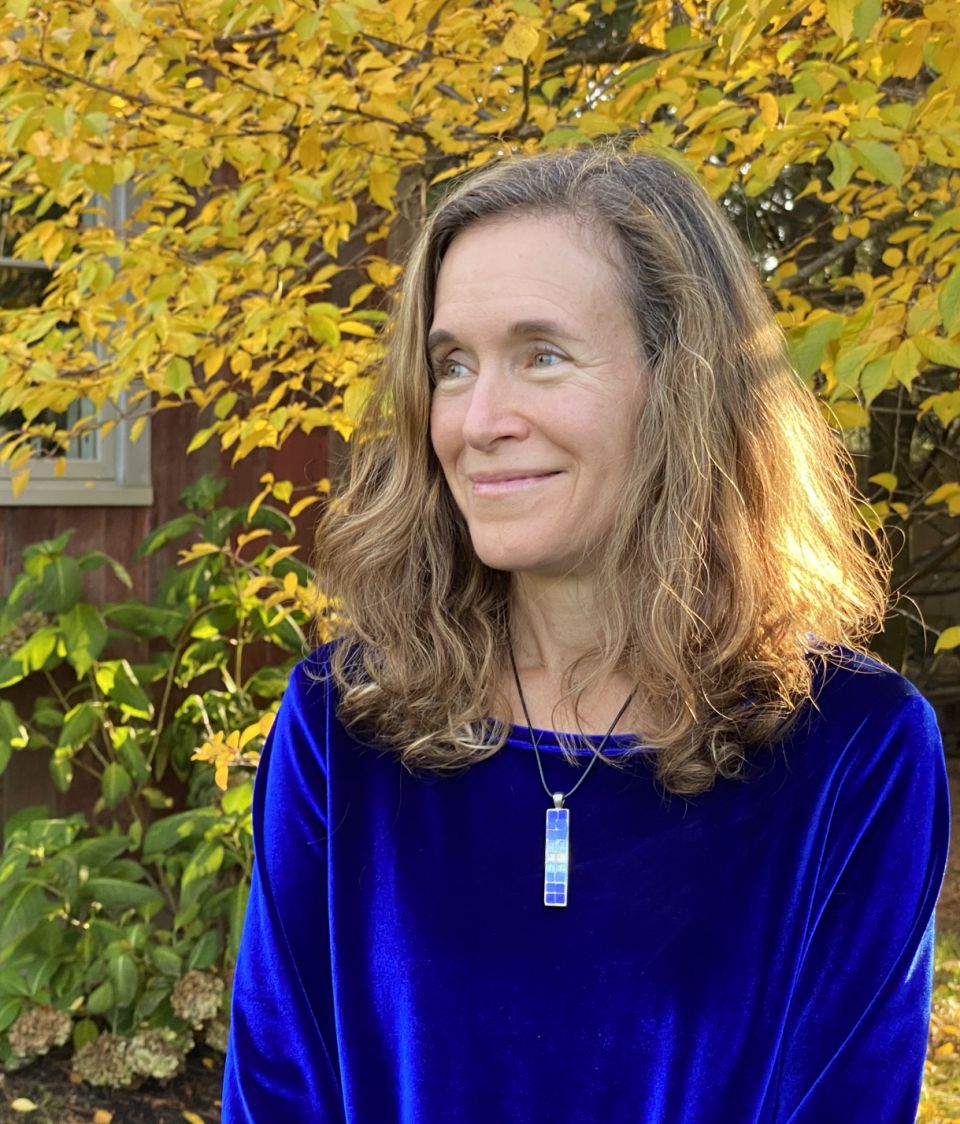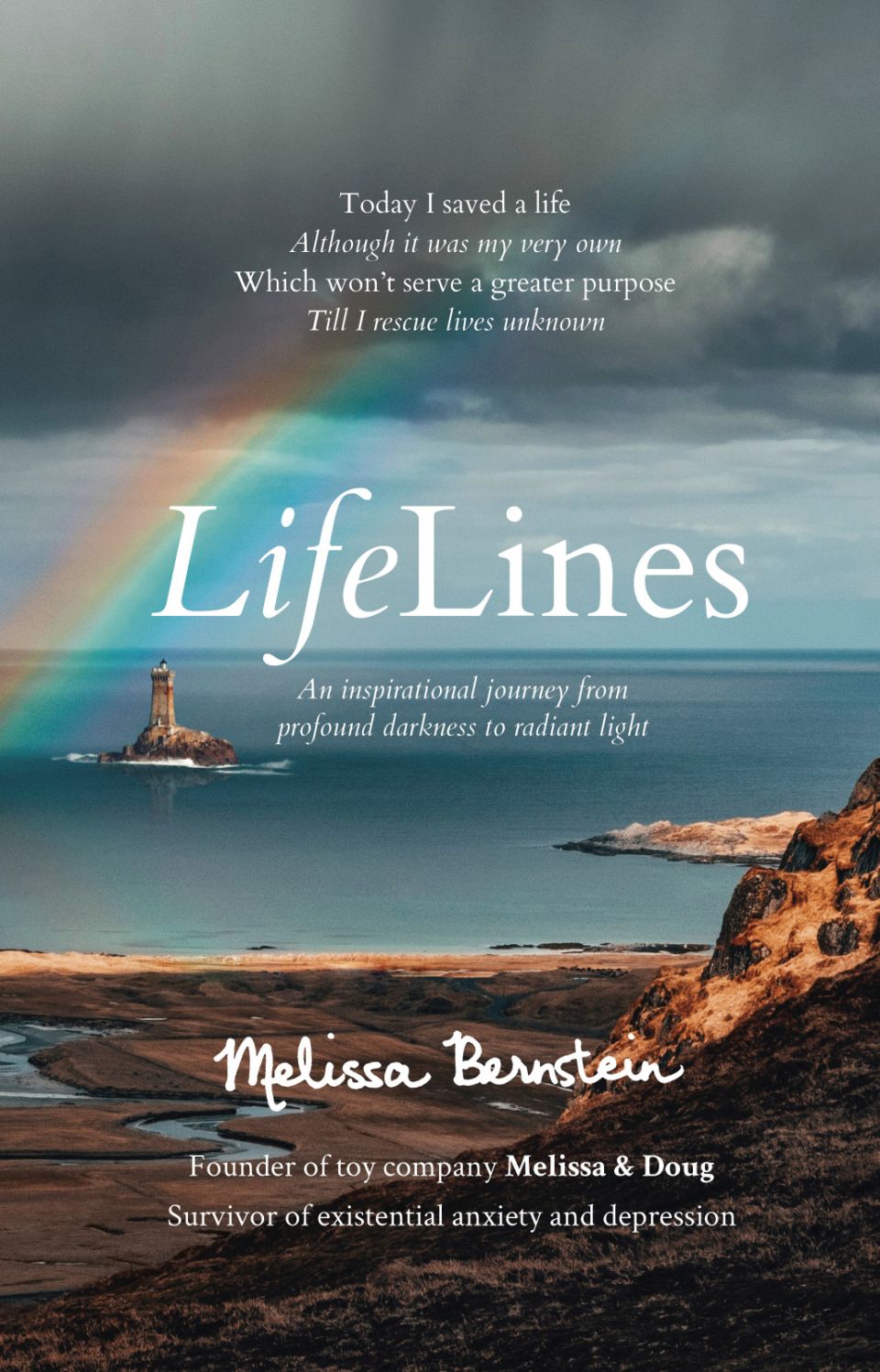
As co-founder of the popular toy company Melissa & Doug, everything Melissa Bernstein touched — from peg puzzles to pretend play kitchens — teemed with a Technicolor levity. But, as her achingly honest new memoir reveals, Bernstein herself was living in “profound darkness” as she battled what she calls “existential anxiety and depression.”
Bernstein — who was just in her 20s when, in 1988, she and her then-boyfriend, now-husband Doug launched the brand that would become a household staple — is detailing her lifelong mental health struggle, and the breakthrough she made at age 50, in the book LifeLines, out Tuesday. The mother of six tells Yahoo Life she hopes that her memoir — and its accompanying wellness website, LifeLines.com — will “show others who are hiding in the dark and don’t feel accepted, who might have darkness and feel like there’s still a way for them to turn it into light, that there [is] hope.”
Bernstein says she’s felt “anguish” her entire life, even as a constantly screaming infant, but points to her college years as her “rock bottom low.” She attributes much of this to no longer having a creative outlet, having decided to give up her music — she played four instruments and wrote songs — in order to pursue higher learning.
“When I went to college, I basically ceased doing anything in my heart that brought me joy,” she says. “I decided, I’m going to go to college. I’m going to get A-pluses in every class. And I’m going to be the epitome of social perfection and get into the best sorority and be accepted socially. Those were my two goals. And I ceased doing anything that had ever brought me joy in my heart.
“I failed in both those, endeavors. I got rejected from the socially acceptable sorority with the tall, Barbie-looking blondes, who I was nothing like, but wanted to be accepted by. And I also didn’t get A-pluses in everything and had a situation where I’ve put so much pressure on myself and took on so many demands that I was unable to complete this paper and had to take an incomplete. And that coupled with a social implosion pretty much brought me lower than I had ever gotten.”
During this time, she experienced suicidal ideation.
“I had a complete breakdown and basically carried around a bottle of pills in my pocket for a year and really opened the lid quite often … they would have absolutely taken my life because I had made that cocktail very deliberately,” Bernstein says. “That was when I was worthless, in my estimation, socially and academically, which were my only forms of validation. And I had nothing to fall back on because I had nothing that I did in my heart anymore.”
Later, she studied abroad in Japan, during which time she struggled with an eating disorder.
“I was such a mess, and I was away from anyone who could see me so I could punish myself to no end,” she recalls. “I basically had anorexia of the soul… I took charge of denying all pleasure and controlling anything and everything I could. That was a slow death, to be honest with you.”
She credits meeting Doug — hailed as the “lemonade to my lemons, the silver lining in my dark clouds and the lighthouse in my stormy seas” in her book’s dedication — and finding a new creative spark as they began launching Melissa & Doug’s first toys as a sort of “salvation” that helped her “channel all that deep anguish and despair into lightness.”
But while building both a multimillion-dollar toy company and a large family, with six kids ranging from age 13 to 27, offered solace, Bernstein says she could never shake off the depression and anxiety that tormented her.
“It’s really a profound crisis of meaning,” she says of her existential depression. “I was asking three questions my whole life. Why am I here? What is the meaning of life? If we are all ultimately just going to die and turn to dust, what am I meant to do in my brief time here? And unfortunately, when we do not get answers to those questions, what does it leave us feeling? Profound unsettledness, anxiety, futility toward life and despair.
“I lived in this state of absurdity — like, why are people going around acting like nothing’s wrong when it’s so wrong? — and unsettledness and [felt] like I was from another planet because no one seemed to be plagued by this deep sense of futility that I felt.”

Though Bernstein didn’t seek professional mental health support until four years ago — “seeking therapy for me would have been tantamount to admitting I was wrong” — she had a breakthrough at age 50. In the course of studying philosophy and psychology, she began to better understand how her creative, “hypersensitive” personality was tied to not only her anguish but also her success — and how she might harness that in a more positive way.
“A few dots started connecting to show me that a lot of what I experienced and felt my whole life and had run away from were actually the very qualities that gave me that ability to create from nothing,” she says. “And when I started to see those dots connecting and this burdensome personality that I had denied, rejected and tried to kill my whole life — because it stigmatized me and made me different from who I wanted to be like, which were very conventional, mainstream, popular people — I began to, for the very first time, see it in a different light and see it as a blessing, not a curse.”
She is now working with a therapist to help her find self-acceptance and create an intentional practice, which includes walks, tea and music, that keeps her balanced and at peace.
“Part of my healing was realizing that I have a full spectrum of emotions, from the highest of highs to the lowest of lows,” she shares. “And because I am a hypersensitive person, which gives me the ability to create, I’m going to have more of those than perhaps people who aren’t creative types. So every day is going to have vast differences in highs and lows and ups and downs and ebbs and flows. And for me to be able to accept all of it and not resist it and be OK when I’m having a period of lows — which I have like everybody, but maybe even more so because of who I am — I need a practice to engage in, to help keep me equanimous in the face of life’s ups and downs.”
With LifeLines — which includes poems and lyrics Bernstein compulsively wrote during dark moments — she hopes that her mental health journey will resonate with others experiencing similar strife.
“I love making toys more than anything and I will always be part of Melissa & Doug,” she says of her foray into the wellness space. “But I also know that I have the responsibility to help others who are in a really low place.”
Read more from Yahoo Life:
Want lifestyle and wellness news delivered to your inbox? Sign up here for Yahoo Life’s newsletter.
